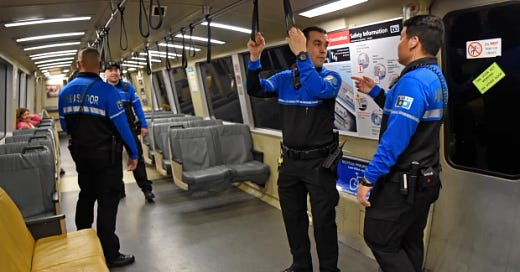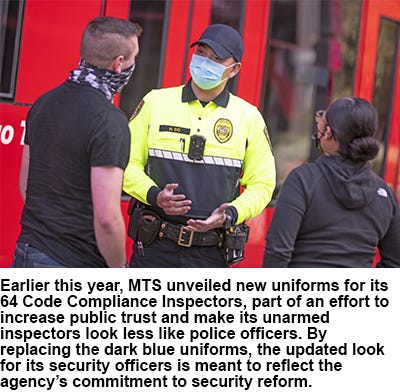Across the country, transit agencies are hiring transit ambassadors who often perform many of the same functions police officers do.
Police department media relations units are working overtime trying to convince the public that transit ambassadors are great for public safety, calling them a ‘force multiplier.’
“Increasing our presence in the system is vital to making sure returning riders feel safe,” said BART Police Department Chief Ed Alvarez. “We are among the first transit police agencies in the country to take the approach of using non-sworn staff in this way as a force multiplier. Transit Ambassadors and Crisis Intervention Specialists are making a difference everyday through dozens of welfare contacts and responding to calls that free up my sworn officers for other emergencies.”
Transit ambassadors and Crisis Intervention Specialists are really government officials masquerading as unarmed police officers.
“Progressive Policing and Community Engagement Bureau’s” are being used to justify hiring transit ambassadors and crisis intervention specialists.
“The Progressive Policing Bureau is home to BPD’s Transit Ambassadors and Crisis Intervention Specialists. Currently the Progressive Policing Bureau includes 10 Transit Ambassadors and 15 Crisis Intervention Specialists who work in coordination with sworn officers. Those non-sworn, unarmed staff are on the job across the system and combined are walking dozens of trains and checking on dozens of station platforms each day.”
The BPD’s Progressive Policing and Community Engagement Bureau lays it on thick, saying transit ambassadors are about “safety, outreach and education.”
BART’s deputy police chief said, “the mission of this bureau is safety, outreach, and education...” but as is typical with police departments nowadays, they declined to elaborate on how transit ambassadors accomplish any of those missions.
What we do know is BART’s transit ambassadors have conducted 12,000 “educational encounters while checking in with 10,000 people” last year. According to the San Francisco Examiner, the term “educational encounters” appears to be cop-speak for issuing citations to commuters.
“From February to August, ambassadors recorded 7,387 “educational contacts,” meaning they initiated a conversation to explain a transit rule violation such as eating, fare evasion or not wearing a mask…”
I have been unable to determine what “checking in” with commuters means but if they are keeping track of this statistic one can assume that transit ambassadors are conducting stop and identify interactions with 10,000+ commuters a year.
BART’s unwavering devotion to the ‘If You See Something, Say Something’ program, means transit ambassadors will treat minorities with suspicion.
Transit agencies in Massachusetts, New York, Ohio, and Wisconsin are using transit ambassadors to allegedly “bring a sense of security to new riders.”
The Vine Transit Ambassador program claims to be “a circle of people helping people to break down barriers and fears of using local transportation, but they never asked why people are afraid to use public transit.
Vine Transit encourages people with disabilities, seniors, and bilingual transit riders to become transit ambassadors, while the Roseville Transit Ambassador program says people who become transit ambassadors “have a great opportunity to make an important contribution to your community.”
In the state of Washington, Sound transit ambassadors are being used to enforce transit fares.
Fare Ambassadors will enter trains from both ends of the car and ask every passenger for proof of payment as they work their way toward the center. The process has been used by fare enforcement officers previously to ensure equal treatment of all passengers.
The lengths transit police departments will go to convince the public to accept transit ambassadors is stunning in its complexity as the Massachusetts Bay Transportation Authority’s “Block by Block Transit Ambassador Program” reveals in its “Positive Imaging” document, such as “improving your body posture, to smiling when you talk to commuters because it puts people at ease and makes you likable.”
All of these public contacts and interactions have been carefully orchestrated by Block by Block an SMS Holding Company whose job it is to “drive the positive perceptions your public space needs.”
It is disheartening to see police departments across the country use so many corporate hijinks to trick a gullible public into accepting transit ambassador programs.
As the role of transit ambassadors evolves so to do the color of their uniforms and equipment.
As you can see, the color of a transit ambassadors uniform means nothing when they wear badges, body cams, tasers and handcuffs “to reflect the agency’s commitment to security reform.” (To see CTA transit ambassadors with K-9’s click here, to watch a video about BART transit ambassadors getting rid of tactical belts click here.)
The San Francisco Examiner article revealed that transit ambassadors will be converted to police officer union positions. That is the reality of progressive policing.
Progressive policing is a carefully constructed public relations campaign run by the SMS Holding Company to trick the public into believing that police departments care about the public, when all they really care about is creating more paid positions for law enforcement.
Once that new car smell of transit ambassadors wears off, all the public is left with is that same tired old gas guzzling car (oppressive policing) that Americans have come to loathe.
Image credit: EastBay Times, Seattle Times, California Transit Assoc.






Greater Cleveland Regional Transit Authority's K-9's
"Seven teams of officer (handler) and K-9 (canine), one team of dual-purpose training."
https://www.riderta.com/transitpolice/K-9
Nothing makes you feel safe like more armed goons.